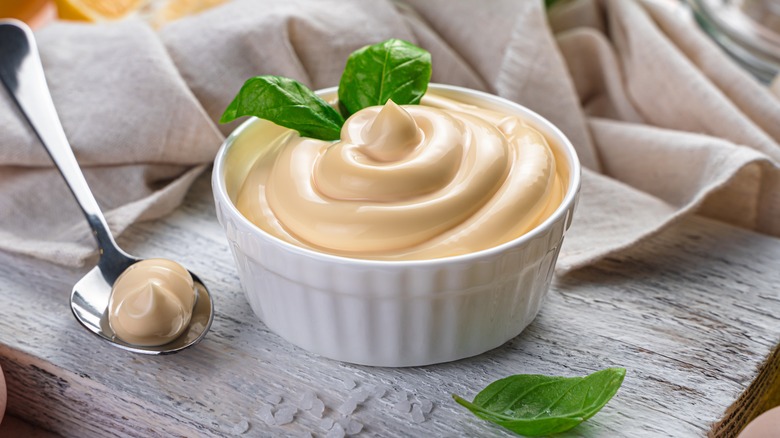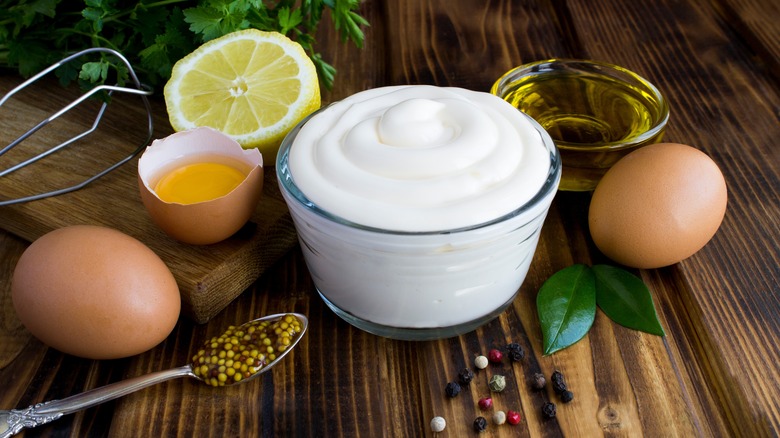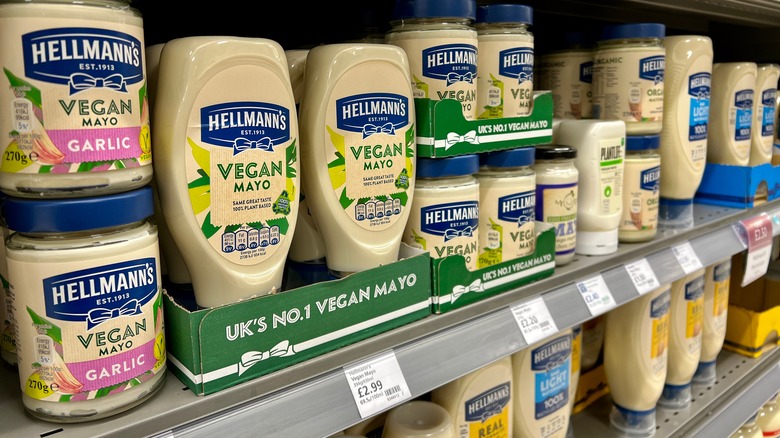Mayonnaise's Heated Origin Story
We may receive a commission on purchases made from links.
Mayonnaise is so simple and ubiquitous that many have never stopped to wonder where it came from. It's just oil and egg, after all, per MasterClass. Despite its plain reputation, there's a bit of interesting chemistry going on in mayo. It's an emulsion, a suspension of substances that don't naturally mix together. By gradually adding oil to raw yolk and whisking it, chefs coax small bits of oil to spread out amongst the watery egg. Other ingredients like lemon juice and mustard are often added in small amounts to flavor it. The result is put on everything from French fries and fish to salads and sandwiches.
That versatility makes mayonnaise quite common in food. It's used a lot nowadays in all sorts of cuisine, especially American fare. As explained by The Takeout, though, it's classically associated with French cuisine. Julia Child and Simone Beck in "Mastering The Art of French Cooking" credited mayo as being the leader of a wide array of sauces, including rémoulade and tartar. Does this mean France is the origin point of mayo?
A brief look at mayonnaise's history
Per Slate, at least two countries were involved in the creation of mayonnaise: France and Spain. In 1756, the Seven Years' War brought French forces to lay siege against Port Mahon on the island of Minorca, which is now part of Spain. The French were victorious, but when their chef went to make a victory meal, they found they lacked cream for a sauce. Instead, they used egg and oil and named the new condiment after the site of their success. "Mahon" became "mahonnaise."
Food antiquarian and bookstore proprietor Tom Nealon explained to Bon Appétit that "mahonnaise" might have been based on something called "Salsa Mahonesa," a sauce created by Minorca. Was the whole point of the French invasion actually to get their hands on some secret sauce?
The truth is lost to time. Mayo didn't show up in French texts until 50 years after the battle for Port Mahon, so it seems unlikely it was the true origin. One French gastronome pointed out Port Mahon wasn't even famous for food (via Slate). Instead, they posited the French town of Bayonne invented it, and "mayonnaise" was originally "bayonnaise," mispronounced over time. Could the French word "manier," meaning "to stir," have inspired mayo's full name? Perhaps the Old French word "moyeunaise," meaning "egg yolk," is responsible. Who knows the true answer?
Aioli ancestor and the future
One thing we can say for sure is that mayonnaise was not the first sauce to exist — it wasn't even the first of its kind. Writer Sam Dean for Bon Appétit points out that mayo is probably a spiritual successor to aioli. As explained by the Food Network, aioli is another emulsion composed of olive oil, mashed garlic, and salt. The thick sauce is used in Mediterranean food, especially fish stew. Like mayo, aioli sauce also goes well with sandwiches and veggies.
How do we know aioli is older than mayonnaise? According to Encyclopedia Britannica, a Roman historian was the first to document aioli's existence. The scholar, named Pliny the Elder, lived in the first century A.D. and wrote "Natural History," in which he chronicled Catalonians beating up garlic in oil and vinegar — essentially aioli. As such, it's no real wonder aioli is commonly associated with Spain and nearby France today.
Mayonnaise has ancient roots, but what does the future hold? In the relatively more recent 19th century, the French championed mayo, per Slate. From there, it spread across Europe to the Americas and beyond. Twentieth-century technology made the mass production of mayo easy, and companies like Hellman's popularized the stuff. In the 21st century, some people have come to hate mayo, as noted by both Slate and The Takeout. Nevertheless, mayonnaise has a proud (if murky) history.


